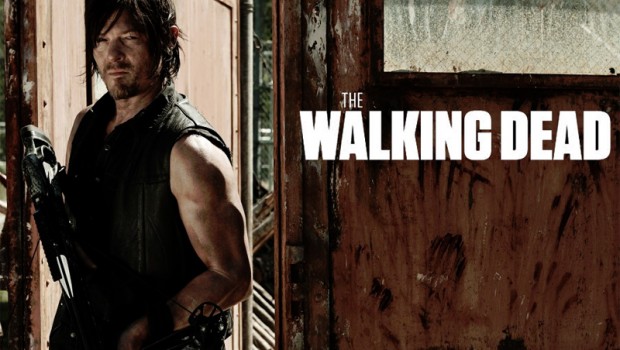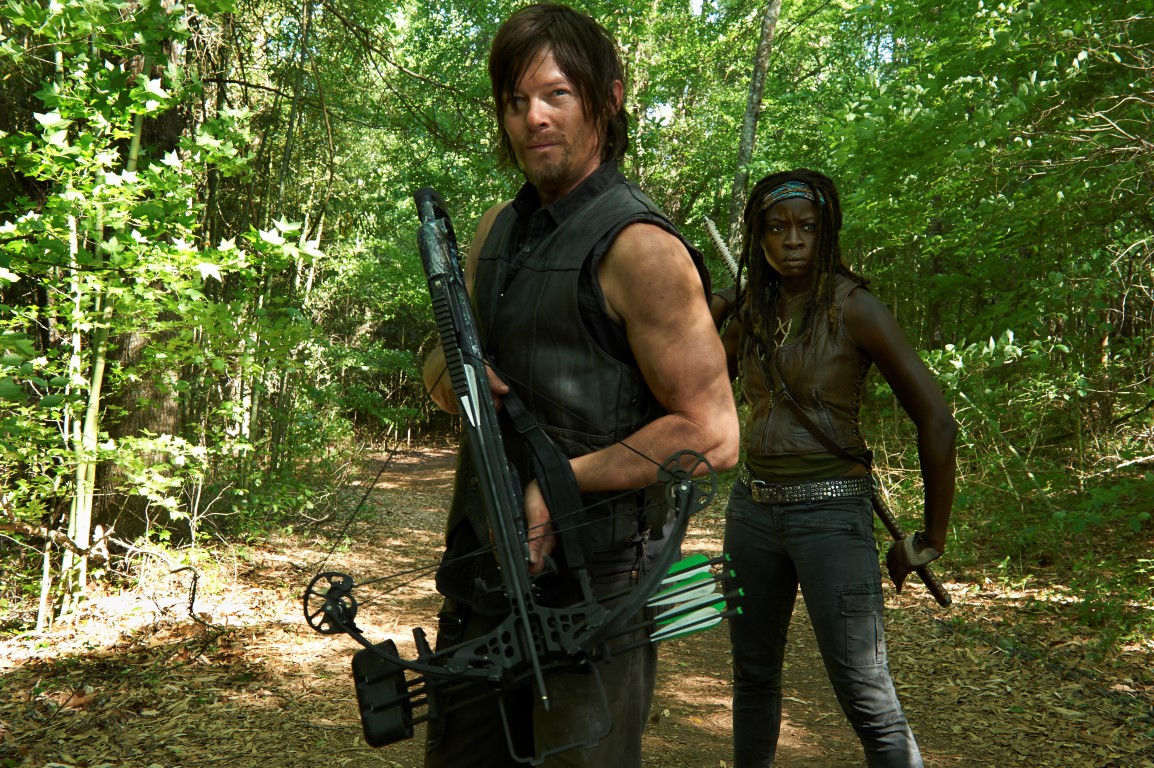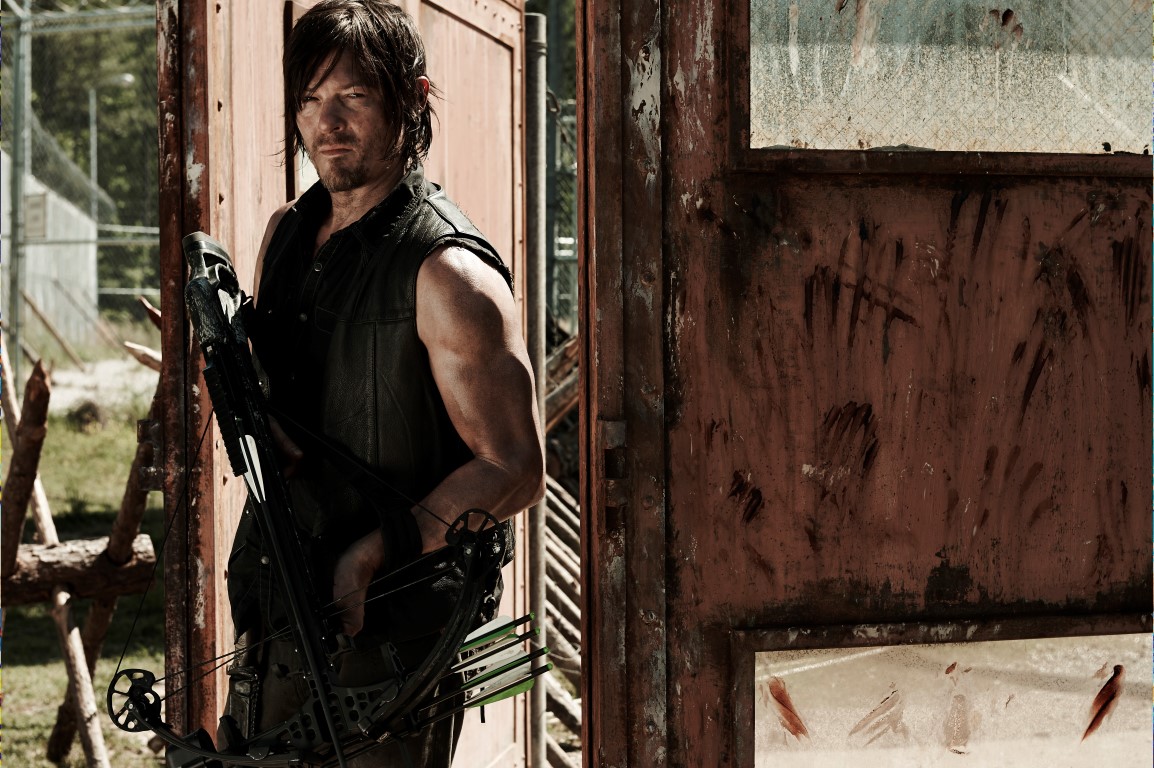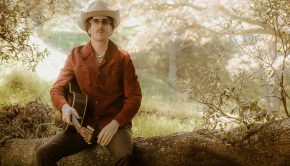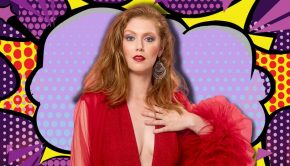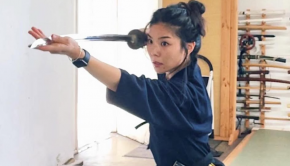Norman Reedus Interview (The Walking Dead)
Norman Reedus Interview– The Walking Dead, Season 4 by Lee Howard
Rocking up in his biker gear, Norman Reedus has come back to The Walking Dead set on what’s supposed to be his day off, to talk about season 4 of the show and the new threats the group of survivors face.
His character Daryl lost his brother Merle last season and, although he experiences grief, which Reedus delivered in a powerful emotional scene in the penultimate episode, he continues to emerge from his older sibling’s shadow.
Daryl’s journey from redneck to loyal warrior, crossbow in hand, as a vital part of the group, has struck a chord with many. Lining a rural road of Georgia where new scenes are being shot, fans try to catch a glimpse of their idols in action working on season 4. Talking to a few of them, Reedus’ name comes up as their favorite, an inspiration to many in this area of the Deep South; people who have battled their demons under difficult circumstances.
“I have put a lot of blood, sweat and tears into this guy and I am glad people are liking what we are doing here,” says Reedus. “Daryl is really popular; he’s chosen to not give up; he has chosen to be somebody in particular and I think that idea resonates with everyone.”
Q: How different does season 4 feel in terms of going deeper into the characters and the increase in the gore factor?
NR: Yeah, there’s a bunch of different elements this year. As far as the gore factor, there is a new threat that is happening. It’s an internal threat and that along with something else has caused us to run away from where we were so as people and as a group, and there are certain leadership responsibilities that are delegated in different ways this year. It’s not the same prison it was when we left it in season 3. You come back in and things almost feel calm for a second, and there’s a sense of environment and a sense of family and unity that wasn’t there before, which quickly gets destroyed. Chaos ensues and it becomes a different world for all of us. Also, with this new threat, there is another way that they have introduced our zombies and our monsters and our way of dealing with things, so it is a whole new vibe this season, to be honest.
Q: Andrew Lincoln said Rick has is looking after pigs in this new community in the prison complex. The season 4 set has a new canteen and crops growing. What’s Daryl’s job, gardening?!
NR: Yeah, I think Daryl can do anything. You have a lot of time on your hands if you think about it. Somebody asked me the other day, “How in the world does Daryl not run out of arrows?” Well, we go around and find what we’ve shot and take them back out and keep them and go on runs and this is the South, that’s a weapon people to use to hunt with, a very popular weapon, so it wouldn’t be hard to find them. And they are like, “Yeah, but we never see that?” Well, you never see us go to the bathroom either, I am sure we do that. (laughs)
Q: Daryl is very effective at slaying walkers. He’s a fighter…
NR: I have always tried to play that character like he has had his back up against the wall his entire life. There are reasons why people fight, some people fight to protect people, some people fight to prove a point, some people fight for different reasons, but I try to play him like he fights, because he has always had to fight and it is sort of a scorpion way of dealing with things. If there’s a threat you sting it and you walk away, like you just get it out of your face. He doesn’t have a problem killing, and he doesn’t have a problem protecting, and I think he has a sort of ferocious nature to him when it comes to killing people or monsters. And I think it has to do with his upbringing, he lashes out first and reasons second. I think we all deal with them in different ways. The reason Carl kills them is not the same reason why Glenn kills them. We all have our different ways. Daryl is eliminating threats.
Q: Why is Daryl so popular, do you think?
NR: I think he is complicated. He can hunt, he can take care of himself, he can track his own food, he is kind of equipped already for the situation, but the interesting thing about him, he is not really mature in the ways of human interaction. At first, he is forced to stay with these people. Even early on, going looking for Sophia, he would take off to go find her, and Rick would say, “Stop, don’t go, wait for all of us to make a plan and we will all go together…” and he would say, “Nah, man, I am better off on my own.” So, I think it’s the people he started these relationships with is sort of the glue that kept him there and I think he has become a better man without realizing it. He was sort of doomed to become mini-Merle. But I didn’t want to take drugs in the show, I didn’t want to say racist things in the show, like Merle, and I was trying to plan that he was sort of embarrassed of who he was going to become. I think he sort of found this sense of self-worth through these people that he wouldn’t have found otherwise if this situation didn’t happen and I think watching a complicated character sort of become a better person in this scenario makes it very interesting.
Q: He is getting nicer, and nicer, does that continue in season 4?
NR: He is always teetering between doing the right thing and ripping your face off.
Q: You said you didn’t want Daryl to take drugs and say racist things. Is that how he was originally written?
NR: These are early scripts that had his character taking drugs, and saying certain things, and I spoke to the show writer at the time and told him I would rather not do that, I would rather play him as someone who really lived in that way, but didn’t want to grow up that way. He did things out of shame and he did things out of guilt and he did things because he was sort of pressured by his family and his big brother to do things that way. It also made the relationship between Daryl and Merle more interesting, and I knew that I was veering off with this family, and this family was going that way and to create conflict between those two directions there had to be difference in attitude, between those two people. I couldn’t just be mini-Merle. He had to become his own person, he had to blossom into his own man, and he couldn’t do that with Merle around. Merle was the thing that was keeping him down. So, with early scripts I fought against doing stuff like that.
Q: What about his relationship with Carol, how do you see that playing out?
NR: It’s the same with love interests. Everyone is always asking me, “When are you and Carol going to hook up? When are you and so and so going to hook up?” And I think I would rather play him like he doesn’t have any expertise in that arena. Like, all the awkward things that happens when a boy meets a girl and he doesn’t know how to talk and he doesn’t know what to do, all those things are so much more interesting than just grabbing a girl and throwing her against a tree in the moonlight. And it would be very obvious for me to take that route, and I think staying away from that, makes it a bigger deal, and makes it more real. I am not playing Daryl as a virgin; I am playing him as he doesn’t know how to woo a woman, he doesn’t know how to behave, because he is just now becoming who he is and he is just starting to figure things out. So, I think once Daryl hooks up with somebody, it is done, it is a big cherry to pop. Excuse the expression!
Q: The death of Merle took something away from Daryl as well as liberating him.
NR: It’s how you look at it. You unscrew a jar and you open the jar, and yeah, he lost the lid, but he is also opening himself up to a whole new world that he never would have experienced if that lid didn’t come off.
Q: Is that a good thing, or a bad thing?
NR: It is a different thing.
Q: You probably have the best life insurance on the show next to Andrew Lincoln, because you are such a popular character…
NR: Can you not ever say that, don’t give these writers any ideas! (laughs)
Q: It must be strange to be on a show where people are just keeling over left and right no matter how important they have been, no matter how essential their role was. Do you think, thank god they sent me all this fan mail?
NR: Yes, and no. The more people that become interested in the character, the more people form an opinion, the more people think that they know the guy. I think part of the point is to continually, not to shock people, but to introduce new levels of this guy. Once people think they have a set idea of everything that they think he is about I think it hurts the creative process in a way sometimes. On the other hand, I like that people are relating to this character, because it is a group effort here and we work really hard to make all of the characters interesting and I have put a lot of blood, sweat and tears into this guy and I am glad people are liking what we are doing here.
Q: Last year on set you had some unusual fan mail, someone sent you a silicone implant. What about this season?
NR: God, I got a guitar, like a really expensive guitar and I tweet it out and said, “Please don’t spend money if you send me things.” I like little kid drawings and stuff, don’t spend your own money. And the lady actually contacted me and said, “I think you must be referring to me, and I did send you a guitar.” And I wrote her back, “Where do I return this? I can’t take this, it is too expensive.” And she said her husband had a huge guitar collection, and he was a solider in Afghanistan, and passed away and Boondock Saints was his favorite movie and he played it every day and talked about it all the time. He had this big collection of guitars, she thought he would want me to have one, so she just picked one out and gave it to me.
Q: Did you keep it?
NR: I did, I gave it to my son, I passed it on to him, because I don’t know how to play guitar, but he does. I get a lot of things. Little kid drawings are my favorite stuff.
Q: What do the younger fans draw?
NR: They draw themselves, me, or Daryl riding a dragon, all sorts of stuff. I think it‘s fun.
Q: What you did with that little silicone pouch that you were throwing around last year?
NR: It’s my phone cradle in my trailer. (laughs)
Q: You get so much fan mail from admirers. You’re so popular with women, especially. What kind of women do you like?
NR: What kind of woman do I like? Do I have to have just one answer? I like a lot of different women, all at once – no (jokes), the same thing in women I like that everyone likes, a sense of humor, not to take themselves too seriously, a generally happy person, and its hard to have a relationship with anybody, when there is a lot of popularity around you, especially with all the social media out there and all that. I can’t go to a bar sometimes, I can’t do stuff like that, and if I do everyone has an iPhone and they are pointing it at you and they say, “Can I take a picture?” And then it is on some Facebook page. You have to have a lot of patience to go out with somebody who does this, because you have to be pretty selfish, at times, to put this much work into your job, and this much time into your job, to be away from home and be in Georgia for seven months out of the year. So, patience is definitely something I look for.
Q: What do you like about Daryl that’s fun to play?
NR: Aw, he is great. I think he is super interesting, for all the reasons I mentioned before, he is becoming this different person, but he is awkward, he means what he says, he wears his heart on his sleeve, he is completely loyal. I have always said, he is kind of like this wild feral dog, a coyote in the woods or something, but if you approached him in an alleyway in the rain, he would just snarl at you like he was going to rip your face off. But if somehow you could spend some time with it, feed it, take him somewhere warm, he will stay by your leg forever, like he’ll just protect you forever. He has that about him, which is really admirable and interesting. But he is also like a little kid in a lot of ways. I always say that Chandler’s (Chandler Riggs) character, Carl and Daryl, they get a long really well, because Daryl is a child-like adult, and Carl is an adult-like child. I find him interesting for so many different reasons, and the fact that he didn’t know exactly who he was when this all went down and he is sort of becoming someone new. I don’t mean he is getting harder, because he is kind of going in the opposite direction. You can’t take the hard away from him, but you can give him different reasons to be hard than he has before.
Q: What made you want to act, to do this job and what’s the appeal for you to continue?
NR: I have done a lot of shows as a painter, as a photographer, as a sculptor with rock and metal and wood and a whole bunch of stuff. When someone approached me about being an actor, first I was like, “Get away from me.” I thought it was basically modeling with your words, but I did the first film and it was called Floating (1997), and at the time that movie was about a kid who’s at the age when he leaves home, and all his friends leave home to go to college and what not, and start a life for themselves, but my father in the movie was in a car accident, in a wheelchair, so the guilt about leaving your father or about staying and taking care of him, and he laid it on thick. But my real dad was in a wheelchair at the time, he was dying. I didn’t quite know what I was doing, but they said, “How do you want to prepare for this scene?” In the scene, I come out, and I just start bawling, he gets up out of the chair a little bit, and it’s a big deal, so I said, “I don’t know. What are my options? I have never been on a movie set before.” I said, “Let me just call my dad for five minutes and come and get me.” I call my real dad, we go out and I just bawl like a baby, and the first take they couldn’t use because so much stuff came out of my face, but we did it again and we broke for lunch. I went to my trailer and I took a nap, and after that scene one of the grips came up to me and he goes, “I know you have never been on a movie set before, but I just want to tell you, at lunch no one spoke. No one touched their food, they just sat there quiet.” And I was like, wow. I mean, you do an art show as a painter and you go and put yourself on the wall, and you sit behind and watch people look at it, but with acting, it is your face, your voice, it is such a pure way to express yourself once you get over the fear of letting yourself do that, and sometimes you have to interview a director as much as they interview you. You don’t know if you want to give it to them, if they are worthy, or what they are going to do with it. If you are one of those actors that just throws your emotions all over the place at full blast, I can see you becoming a complete wreck.
Q: How did you prepare for that emotional scene, Merle’s death?
NR: I listened to some music and I thought about my dad, and I thought about some things like that. There is a certain amount of loss there that I thought about. There are certain triggers that help you open different faucets and sometimes it is really interesting to let a faucet open and tap it down where it is barely coming out and it builds up and you are trying to hide it, sometimes that is more interesting, to play against what you are supposed to do. It all has to do with where you are at, who you are doing it with, who is watching you, there is a whole bunch of stuff. I don’t think Daryl would have cried like he did with Merle if everyone else was around. I think he would have held it in and cried by himself. Because there was nobody around except him, I think he let it all go. I think if the whole group was watching him do that, he would have really bottled it up and waited until no one was around, and he would have collapsed. It is different every time.
Q: You mentioned your dad and you are a dad yourself. Is there anything from The Walking Dead experience and what it means to you that you want your son to learn from?
NR: I want him to be proud of me at the end of the day when he sees stuff. I steal crossbows every year and hang them on his wall. Not necessarily this show, but I won’t try to do this show and pose here and there and do it fake, because he will see it one day, and I don’t want him to do that with anything. I don’t necessarily want him to be an actor, I want him to put 100% into things, and I think you can tell when people don’t.
Q: It sounds like you have a lot of say in how your character is shaped. How does that work?
NR: Trust me, there are a lot of ideas I have thrown at them and they are like, “Absolutely not!” (laughs). Like, “Can I have a dog? I need a dog. Mad Max had a dog, can I have a dog? What if I am walking down the street with a dog, I will put a bandana on it, it will be my friend and keep the walkers away.” They were like, “No way in hell are you getting a dog.”
Q: Last season, Daryl acquired a poncho. This year you have a bandana, is that right?
NR: The bandana was for a specific reason, it’s funny too, because everyone writes me these letters; there are so many people that send me information from other blogs, everyone just feels the need to inform me about everything everyone is writing all over the place. I had that bandana in the promo, it went around that I am horribly disfigured in this season, like my face is completely scarred, my lips are blown off, all these different things. Our editors, and the people that run this show and very good at throwing people off (the scent), giving you just enough in a certain way where you think everything is headed that way and you have no idea where it is headed. I can honestly say that 99.9% of the ideas that people tell me, or that I have read about are completely false.
Q: It’s a very demanding show, how do you keep in shape? Do you train before the show season begins?
NR: Yes, you do. You do train before and you train during. But running around the woods of Georgia in 120 degrees in this humidity is probably the best weight loss program on the planet. Automatically. And that being said, that crossbow weighs 40-45lbs, so I am constantly doing labor, so my arms can get bigger. I think it would be ridiculous if Daryl took his shirt off and he had a six-pack, it would just look stupid. Other actors would watch me on the show and say, “Oh, there is an actor who is hitting the gym over and over and over again because he has a shirtless scene coming up.” It would just look like that, it would look like I shaved my chest. So I wanted to keep it real. I am kind of trying to go more cheetah and less gorilla, you know what I’m saying?
Q: When you are back in New York, do you miss running around the woods with your crossbow?
NR: Yes, I miss it down here a lot actually. I miss the quiet, I miss the trees. There are no trees in my neighborhood. I live in Chinatown, we have only got one tree (laughs). I miss riding my motorcycle through the country here. Yeah, I miss a whole bunch of it. I don’t miss the chaos of New York, but then again, I miss New York and I miss my friends, but when I go back to New York over the weekends, I really look forward to coming back.
Q: What has surprised you about being on television show over four seasons now?
NR: If you do a movie, you have an hour and a half and possibly a month or two to watch this guy change, and tell this story with this character, but with television, you get to do all the little things that build up and tell a story. You have four years to work on a character, so it’s not just your line means something, and your line is part of the story, it’s how you interact with this person, and how you walk. You have all these tiny areas to play with and it’s something I didn’t see happening when I got this job, because I have never done anything like this. It has rebuilt my faith in doing this. The people I work with, the quality of people I work with and just my entire life style has changed. I don’t mean in any sort of famey way, I mean in health ways and being inspired every day and enjoying what I do, it’s changed the way I live.
Q: Why do you think we have a perpetual fascination with the apocalypse and post-apocalyptic scenarios?
NR: Because our show is a big hit, probably! But there are a whole bunch of them now. I think it has to do with time and it has to do with, not really the apocalypse, but everyone’s own mortality, and just like this show, your clock is ticking, and these are your two feet on the ground so who do you want to be? Who do you want people to think of you as? What do you stand for and what are you willing to fight for and what are you going to put up wit? In that way, Daryl is really popular; he’s chosen to not give up; he has chosen to be somebody in particular and I think that idea resonates with everyone, not just the cast, but everyone watching the show, because there are crazy, f**ked up things happening all the time on this planet, I mean crazy, f**ked up things and your time goes form here to here and what do you stand for? What are you going to put up with and who do you want to be?
Q: Who do you want to be?
NR: I don’t know, still figuring that out!
CLICK HERE FOR A CHANCE TO WIN SEASON 4 OF THE WALKING DEAD ON BLU-RAY


